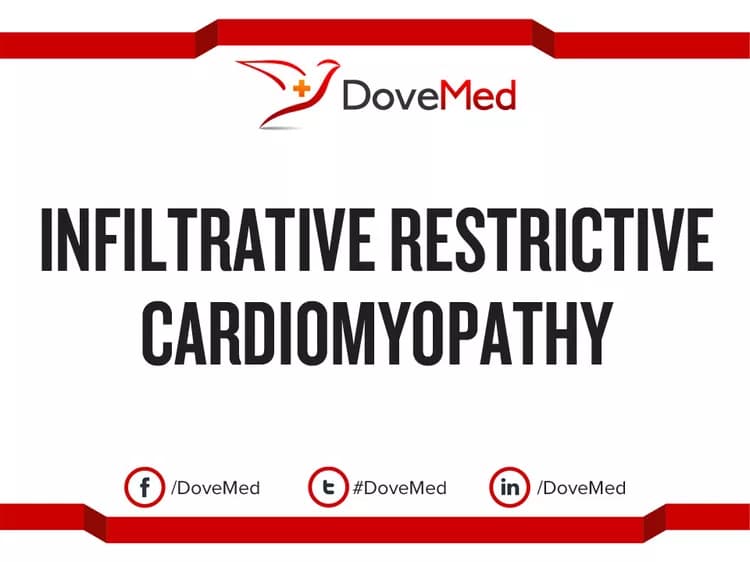The topic Infiltrative Restrictive Cardiomyopathy you are seeking is a synonym, or alternative name, or is closely related to the medical condition Restrictive Cardiomyopathy.
Quick Summary:
- Restrictive Cardiomyopathy (RCM) is the most infrequent of the known cardiomyopathies. The condition can occur in individuals of any age. Cardiomyopathy is a term used for a variety of conditions that affect the muscles of the heart
- Restrictive Cardiomyopathy is characterized by heart muscle dysfunction that does not allow them to relax, and consequently, results in decreased filling of the lower chambers (ventricles) of the heart with blood, between heartbeats. Occasionally, the contraction of the heart muscles that allows the pumping of blood, may also be restricted in RCM
- In some cases, Restrictive Cardiomyopathy is inherited, and having a family history of the condition is a risk factor for developing it. Medical conditions, such as endocardial fibroelastosis (the congenital form in children), amyloidosis, scleroderma, heart tumors, and scarring of heart tissue owing to various heart conditions, are some known risk factors for developing RCM
- Mutation(s) in the TNNI3 gene are known to cause the inherited form of Restrictive Cardiomyopathy. This gene codes for troponin I protein, which, when mutated, does not allow the heart muscles to relax completely. The mutation is inherited in an autosomal dominant pattern, in which a single defective copy of the gene in each cell of the individual is sufficient to cause RCM
- The signs and symptoms of Restrictive Cardiomyopathy include shortness of breath during exertion or while resting, fainting, fatigue, chest pain, and irregular heartbeats. Children with the congenital form of RCM may not grow or gain weight normally
- The diagnosis of Restrictive Cardiomyopathy involves a thorough physical examination, symptom assessment, echocardiography (ECG), electrocardiography (EKG), stress test, coronary catheterization, chest X-ray and other imaging tests. If required, a biopsy of the heart muscle may be ordered
- Some potential complications of Restrictive Cardiomyopathy include aberrant heartbeats (arrhythmia), sudden cardiac arrest, development of blood clot, stroke, and fluid build-up in the tissues and organs
- The treatment options for Restrictive Cardiomyopathy are symptomatic, and aimed at improving an affected individual’s quality of life. These may include the use of steroidal treatments, blood-thinning medications, diuretics, and anti-arrhythmia drugs
- If RCM occurs because of other medical conditions, then getting treated for those medical conditions may help delay its progression. Additionally, the affected individuals may improve their quality of life by leading an active life, losing excess weight, stopping smoking, discontinuing drug and alcohol use, and eating a balanced and nutritious meals
- Restrictive Cardiomyopathy worsens over time, and therefore, the prognosis of the condition is generally poor. On an average, the survival rate following diagnosis is 7 years. A few individuals may live beyond 10 years following diagnosis of RCM
Please find comprehensive information on Restrictive Cardiomyopathy regarding definition, distribution, risk factors, causes, signs & symptoms, diagnosis, complications, treatment, prevention, prognosis, and additional useful information HERE.
Related Articles
Test Your Knowledge
Asked by users
Related Centers
Related Specialties
Related Physicians
Related Procedures
Related Resources
Join DoveHubs
and connect with fellow professionals


0 Comments
Please log in to post a comment.